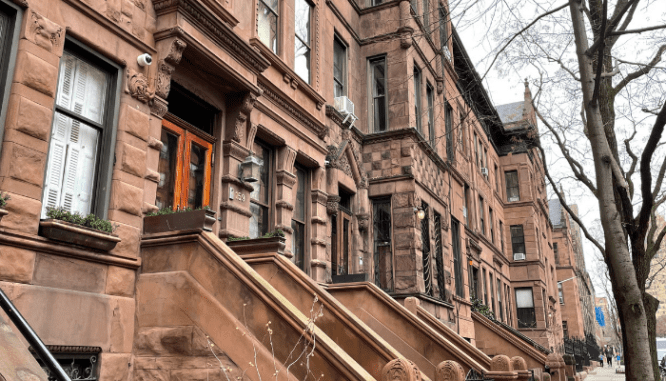Get Your Own Slice of the Big Apple: Buying a House in Manhattan
- Published on
- 5 min read
-
 Lira Samanta Contributing AuthorClose
Lira Samanta Contributing AuthorClose Lira Samanta Contributing Author
Lira Samanta Contributing AuthorLira Samanta is a freelance writer specializing in creative writing, personal motivation, and technology topics. She spends a lot of her spare time curating her Airbnb wishlist and dreaming about building her own She Shed. Using her economics and data science chops to study trends in real estate prices, she is always excited to find a great deal.
At HomeLight, our vision is a world where every real estate transaction is simple, certain, and satisfying. Therefore, we promote strict editorial integrity in each of our posts.
If you’re ready to buy a house in Manhattan, congratulations! Being able to afford a home in this swanky NYC borough means enjoying unparalleled access to the world’s preeminent nexus of culture, cuisine, architecture, and finance. Internationally renowned museums like the Met and MoMA, theater productions on and off-Broadway, and the culturally ubiquitous Central Park are all just a subway ride away for Manhattanites.
But getting to live in such a cultural epicenter means getting ahead of an exceptionally competitive real estate market. It’s no surprise that in a city with more millionaires than any other place in the world, the most desirable properties can go to contract in a matter of days. And if you’ve never experienced home shopping in a world of co-ops before, well, let’s just say it’s not as simple as finding and making an offer on your dream unit.
We interviewed real estate experts with decades of experience to help you win a bid on your own home in Manhattan’s hyper-competitive, fast-paced market.

Know the price of a slice of a Manhattan apple
Despite the economic impact of the COVID-19 pandemic, the median home price in Manhattan was over $1.1 million in Q3 2020 — one of the highest in the country. Size, location, building type, and proximity to public transportation all factor into home prices.
Keep in mind that co-ops, which are housing cooperatives collectively owned by the residents, make up over 70% of the marketplace in 2021, while the rest of the housing stock is typically condos and townhouses.
“Condos cost 30% more on average than co-ops,” says Dylan Hoffman, a local agent with over 19 years of experience, who’s sold 37% more properties than the average New York agent. Hoffman notes that small studios in co-ops can start at $265,000 compared to $500,000 in condos. Studio apartments with an alcove for more space start at $650,000 in co-ops compared to $860,000 in condos. One-bedroom apartments in co-ops can start at $700,000 in co-ops compared to $1.2 million in condos.
Closing costs can range from 2.5% to as high as 6% of the sale price, so be sure to leave room in your budget for your attorney and real estate agent, as well as for filing fees and other required deposits.
Prioritize your metropolitan must-haves
Though cosmetic upgrades like fresh paint and new furnishings can be appealing, don’t forget to prioritize your requirements.
“I always tell buyers to look at what you can’t change,” says Hoffman.
“Are you facing an avenue or a street? Do you have a view of a beautifully manicured garden of the townhouse behind or of a brick wall? Are you across the street from a bus station or from a park?”
If you plan to use the subway to get around, make sure you also assess the distance of any homes you’re considering from your most frequently used subway lines.
Painting and refacing cabinets in your new home are doable, but if you’re eager to make bigger home improvements after your purchase, know that many buildings only allow a few units to be renovated at a time. Getting the necessary approvals can take up to four months, so plan for this ahead of time.
Inspections & attorneys
The standard contract for co-ops and condos specifies that the seller must provide a unit in working order, which means that heating and plumbing systems, as well as appliances, must be ready for use as soon as you move in.
Buyers of homes in smaller buildings (with between 5 and 10 units) pay a larger percentage to cover the cost of building upkeep, compared to those who purchase a home in a high-rise. Jean Chou, the principal attorney at JLC & Associates, advises her clients who buy in smaller buildings to schedule their own inspections as part of the homebuying process.
Hiring an attorney, which is a local convention in New York, eases the burden of buyer due diligence on an entire building’s amenities, including elevator updates and hot water service.
Attorneys also help you understand the scope of future upkeep. “Whenever we look at the building’s financials, we get a sense of whether or not the building has those extra reserves and if there is a significant capital improvement that will be needed,” says Chou.

Challenges to buying your slice of the apple
Unlike other cities, the standard contract for co-ops and condos usually prevents homebuyers from having to worry about typical challenges like mold, termites, or other issues revealed by an inspection. However, cash offers are not uncommon in Manhattan, and knowing how to compete with these is key.
Sellers appreciate cash offers because of their faster timelines, as there’s no need to wait for a mortgage loan. But working closely with your agent allows you to determine what else matters to the seller, like the timing of the deal, or possibly the opportunity to rent back the unit for a few months while they figure out their own next move. A top agent will help you remain competitive even in a cash market.
Flood zones in the city?
You may be wondering what it means for you if your new home is in a FEMA flood zone.
Most homes sold in Manhattan are part of a larger building, and as the building itself may have flood insurance, you may not need coverage of your own. Your mortgage lender will assess the overall coverage and advise on whether you’ll need to purchase flood insurance, particularly if you’re buying a unit on the ground floor of a building.
How to make an offer
When it comes to making a competitive bid on a Manhattan home, “Price is king,” says Hoffman. He also emphasizes the importance of having a complete offer, including a completed REBNY financial form issued by the Real Estate Board of New York, and a preapproval letter from your bank.
Another step that can give you an edge is to write a personalized letter to the seller describing your dreams for your life in your new home. “Sellers love that,” says Hoffman. “They’re so emotionally engaged in their home — they have so many fond memories!”
A powerful letter outlining how you plan to carry on the traditions in this home that were dear to the seller in their years of life there can even help you win a bid against a buyer with a slightly higher offer.
Chou stresses the importance of assembling a good team early on, even before you make an offer: “Not just the right attorney but the right agent and the right mortgage banker or loan officer, ideally as soon as possible, even as you’re starting the search process.
“Things move really quickly here,” says Chou. “A lot of times, it’s not unusual for a homebuyer to submit an offer, and they’re being asked to wire over 10% within a week” for an earnest money deposit.
Be sure you have members on your team who you can trust on an expedited timeline so you’re not grappling for resources with only days left to spare.

The lay of the land in Manhattan
Where to start looking for a home in a borough that has over 50 historic neighborhoods? Some areas popular with home buyers in recent years are:
Upper East Side
The Upper East Side is known for upscale shops and restaurants, as well as the Museum Mile, a long stretch of museums including the Guggenheim and the Metropolitan Museum of Art.
Upper West Side
Bounded on the east by Central Park, the Upper West Side is a primarily residential area and is quieter than some other neighborhoods.
Gramercy
Gramercy is a quiet neighborhood with fewer tourists and is home to the exclusive Gramercy Park.
West Village
Beautiful brownstones and an abundance of cafés and bookshops characterize West Village, which was also the site of the famous Stonewall Uprising in 1969. The legendary Magnolia Bakery got its start here.
Chelsea
Chelsea boasts a plethora of art galleries. It is also home to High Line Park, a unique public space built on top of a historic, elevated rail line. And if you’re an avid concert-goer, Madison Square Garden is just a short walk away.
Greenwich Village
Film connoisseurs need look no further than the IFC Center, a theater that shows the best independent films from all over the world. Greenwich Village is also where the Washington Square Outdoor Art Exhibit takes place in the spring and fall.
NoHo
NoHo is a residential neighborhood with bohemian vibes, where celebrities like Cher and Britney Spears have had homes. Residents enjoy NoHo’s upscale bars, restaurants, and cafés.
SoHo
SoHo, known for its high-end restaurants and boutiques, is one of Manhattan’s premier shopping destinations. It’s also known as the Cast Iron District for its abundance of historic cast-iron buildings.
TriBeCa
A view of the Hudson River adds to this neighborhood’s appeal, as does the annual Tribeca Film Festival which takes place in the spring.

Tips for buyers in Manhattan
Typically, the market is most active in the spring, followed by the fall after Labor Day. However, buying during off-peak seasons can pay off.
“I’ve sometimes had my busiest months in December,” says Hoffman. “I also don’t leave the city in June, July, and August. There could be a really good opportunity to have less competition because the seller who didn’t sell in the spring needs to move the property, so you might get it for a better price.”
Why use a top agent to buy a house in Manhattan?
Manhattan remains one of the most competitive housing markets in the U.S.; it’s consistently in demand.
A top agent will have the know-how to negotiate concessions in your contract, which in Manhattan apply almost exclusively to new developments. It’s possible to get as much as 25% off of the asking price in the form of HOA fees, transfer taxes, and storage lockers. Top agents help buyers save an average of $23,000 when purchasing a home. (That’s a lot of Broadway tickets you could be buying!)
Ready to begin your search? Find a top real estate agent in Manhattan through HomeLight to stay competitive in your Manhattan home buying search.
Header Image Source: (Florian Wehde / Unsplash)
